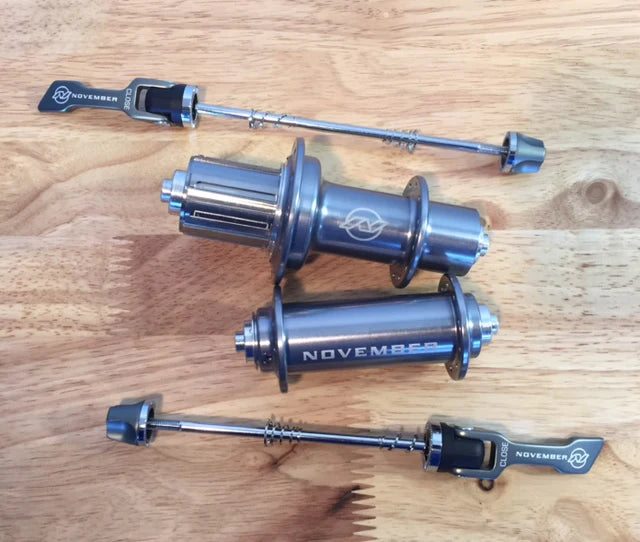The big news in our corner of the world this week is White Industries' acquisition of Rolf Prima / Astral. The companies have partnered for years, with White Industries both supplying WI branded hubs and producing custom hubs for the wheel brands. We're familiar with that arrangement. We've been offering WI hubs in our builds for about a decade, and the Nimbus Ti hubs we produced for use in our Rail wheelsets for a time were made by WI.

November Nimbus Ti hubs, made by White Industries, circa 2015
According to the article on BikeRumor, it's business as usual for both companies for now. No news as of yet to changes in products, distribution or availability. Which is good news for us. We're big fans of White Industries and whatever moves they make to remain a strong business helps us - even if this acquisition makes them a competitor as well as a supplier.
We've seen some considerable product and channel evolution over the past few years in our industry though. During the pandemic most brands suffered pretty severe inventory shortages. If you manufacture rims or hubs and know you will sell out of everything you can get your hands on because so little was available, you figure out how to maximize your profit on the limited stock you have. For many brands, this was all the excuse they needed to ramp up their direct to consumer operations. Why sell a wheelset to a dealer or distributor for $800 or $1400 when you can sell it direct to a consumer for $2400? Look around now and you'll see brands that have aggressively shifted to their DTC channels - Industry Nine, Enve, HED, WTB, Reynolds are all now available direct from the brands (maybe I shouldn't tell you all this), as well as through dealers and online retailers. When we started this business over a decade ago, brands had to make a clear choice on their distribution channel - direct or through the trade.
Today's approach is far more consumer-centric: brands are choosing to be available in the channels where they can find their customers, instead of making customers come find them. It's better for consumers' convenience this way, but not necessarily the consumers' wallet. If a brand is selling a wheelset for $1500 regardless of whether you're buying it direct or through a shop, the cost of building that wheelset has to be low enough so that both the shop and the brand (and maybe the distributor) can take their cut of profit. Selling direct creates a profit windfall because the spoils are not split 2 or 3 ways.
A better economic model for consumers, however, is products manufactured, priced and sold exclusively direct. Here the profit the manufacturer needs is the only profit baked into the price, which means a higher percentage of the customer cost is the actual product itself. Customers pay extra for the convenience of finding a product in multiple channels. But that's all that extra cost is for - convenience, of availability and service. It costs less to manufacture a wheelset sold for $1500 through a shop than it does for one sold for $1500 direct to consumers. Absolutely some of that delta is scale economies. But a lot of it does nothing to alter the quality of the product itself.
Anyway my point is that as brands begin selling direct, there's a period of cake-and-eat-it-too where they are able to capture some extra profit selling direct and still maintain their distribution through the trade. But price shopping is a lot easier online and the pressure to hit competitive price points is real. It will be interesting to see which brands go all in on direct and level their prices around their DTC costs, a move which makes selling through dealers unprofitable. And conversely which ones find that either they are too reliant on the trade to abandon those channels, and/or not able to invest enough energy and resources into selling direct to make it work. My guess is that the strongest brands will enjoy DTC success and leave the shops to sell what the behemoth brands like Trek and Specialized make available to them.
What that means to businesses like ours isn't yet clear. But we do know we face more online competition this year than last year, and expect to face more next year. And the year after that. Which is great if it means that the increase of the number of online sellers leads to an increase in the number of online buyers. I'll stop with that thought because this is long enough and the logical next thought isn't as much fun to dwell on.


1 comment
Just keep emphasizing that your wheels are very strong and reliable (not the“ Our wheels are the lightest!” Crowd) and you will have a nice following
Love my 4 year old gold GOATS !!!